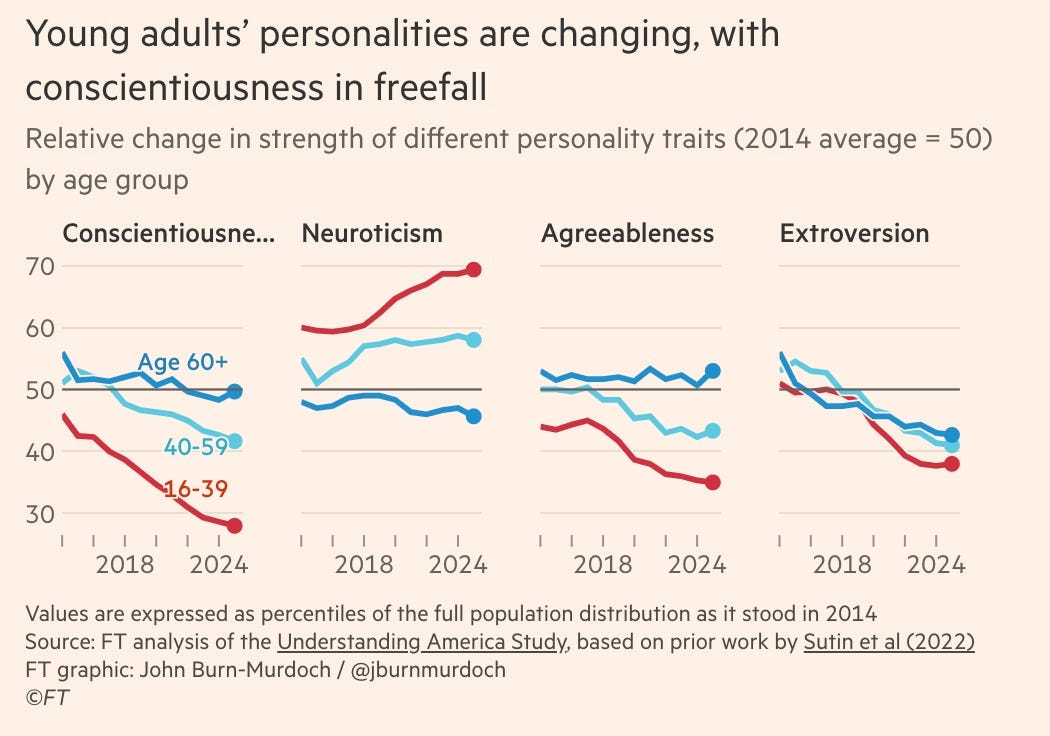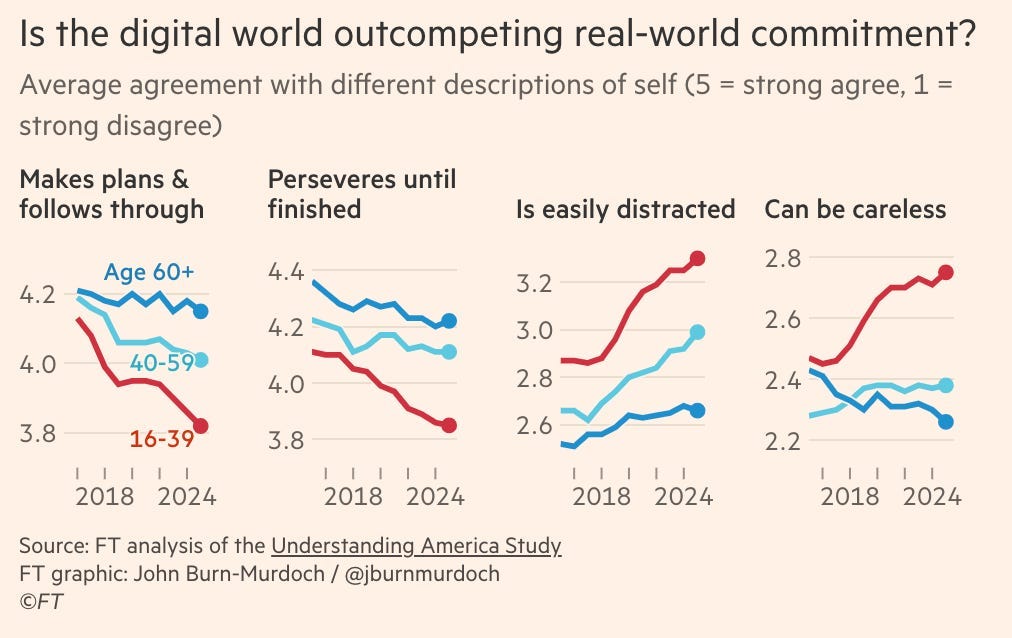Conscientiousness Under Siege: Fighting Back in a Distracted Age
The erosion of conscientiousness is not organic; it is being reshaped by the digital environment.
Dependability. Discipline. Persistence.
These three traits have shaped my life, and they are disappearing from society at an alarming rate.
Earlier this month, the Financial Times (this is a paid article behind a firewall) published data showing that conscientiousness has been in free fall since 2014, especially among younger Americans. Once hovering around 45%, it is now under 30%. Alongside that, neuroticism has skyrocketed, agreeableness has slid further down, and extraversion is falling across every generation.
The Breaking Points team unpacked this research with a simple observation: this is what happens when technology rewires how we live, think, and engage with one another.
I will say this before moving on that there are some circles pushing back on the data as being manipulated and overexagurated. While that is plausible, anecdotally I still believe identifying potentially why and pointing out possible individual solutions is still worthwhile even if things aren’t as alarming as these reports show.
1. Why Conscientiousness Matters
Conscientiousness is not just a personality quirk; it is one of the most reliable predictors of longer life, better health, stronger relationships, and career success. It is the trait that helps you finish what you start, keep your word, and show up when others are counting on you.
Speaking personally, it is the backbone of how I try to live. My DISC profile pegs me as a “Conscience” type, and dependability, discipline, and persistence are qualities I come back to over and over in this blog. They have shaped how I have raised my kids, led teams, and navigated layoffs. So yes, I'm biased here.
Do You Understand Yourself? You Can’t Love What You Don’t Know.
Last week I wrote about how you can’t truly love others until you first love yourself. This week, I want to go deeper—because how do you even begin to love yourself?
2. The Decline Is Real
The data shows a sharp drop in conscientiousness among younger Americans. But it is not just numbers on a chart; you can feel it. Missed commitments, constant distraction, difficulty following through.
Other traits are shifting too:
Neuroticism is surging, bringing more anxiety and emotional instability.
Agreeableness is slipping, with less empathy and less willingness to cooperate.
Extraversion is falling, especially among younger adults who are now the most introverted cohort.
These are not isolated quirks. They are cultural signals.
3. Why It’s Happening
Some of this decline has been decades in the making (Bowling Alone documented the collapse of civic life in the ’90s). But technology has poured gasoline on the fire.
The internet rewards distraction. Attention spans are fractured by endless feeds, pings, and short-form video.
COVID deepened isolation. Years of social distance left trust frayed and habits broken.
The economy incentivizes individualism. When public spaces decline and costs rise, people retreat into private “McMansion” bubbles or personalized digital worlds.
And so we arrive here: a society more connected online than ever but increasingly detached from one another offline.
4. The Human Cost
Here is a simple test: When you are with others, do you ask questions and show curiosity, or do you mainly talk about yourself?
That small measure reveals a bigger truth. We are losing reciprocal curiosity, attentiveness, and empathy, the social glue of meaningful exchange.
The erosion of conscientiousness is not organic; it is being reshaped by the digital environment. Constant distraction chips away at responsibility. Shallow interactions amplify self-focus. The result is weaker bonds, lower trust, and less capacity to care for others, whether neighbors, coworkers, or even family.
5. What We Can Do
The good news: personality traits are malleable. We can push back.
Here are a few small ways to rebuild conscientiousness:
Practice attentiveness. In your next conversation, focus only on asking questions. Train yourself to notice, not just respond.
Keep one promise. Follow through on something small this week, even if no one else notices. It strengthens the muscle of dependability.
Set distraction boundaries. Pick one space (dinner table, bedtime, workout) where the phone does not come with you. Guard it fiercely.
Invest in community. Join or restart something collective, such as coaching, volunteering, or neighborhood events. Conscientiousness thrives in shared responsibility.
This is not about nostalgia for a “simpler time.” It is about recognizing that discipline, dependability, and persistence are not optional in a distracted age. They are survival skills for our families, our work, and our communities.
So this week, let us recommit to one small act of conscientiousness. Because the future of our society may very well depend on how we show up, not just for ourselves, but for each other.




